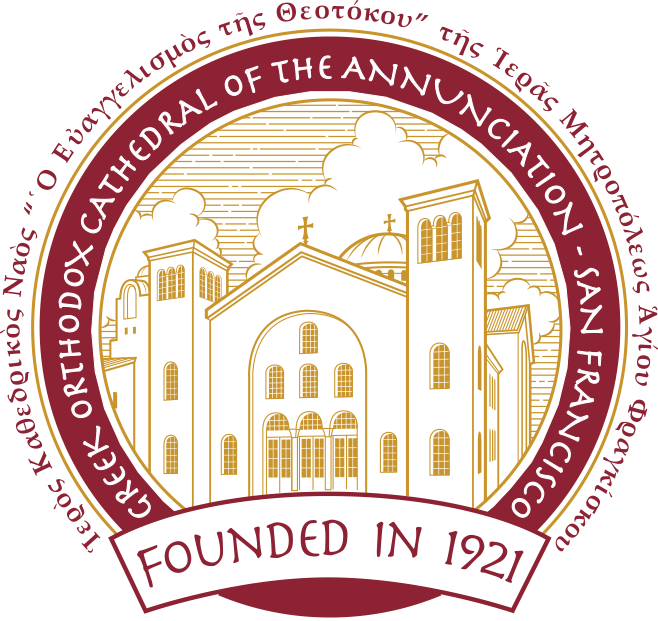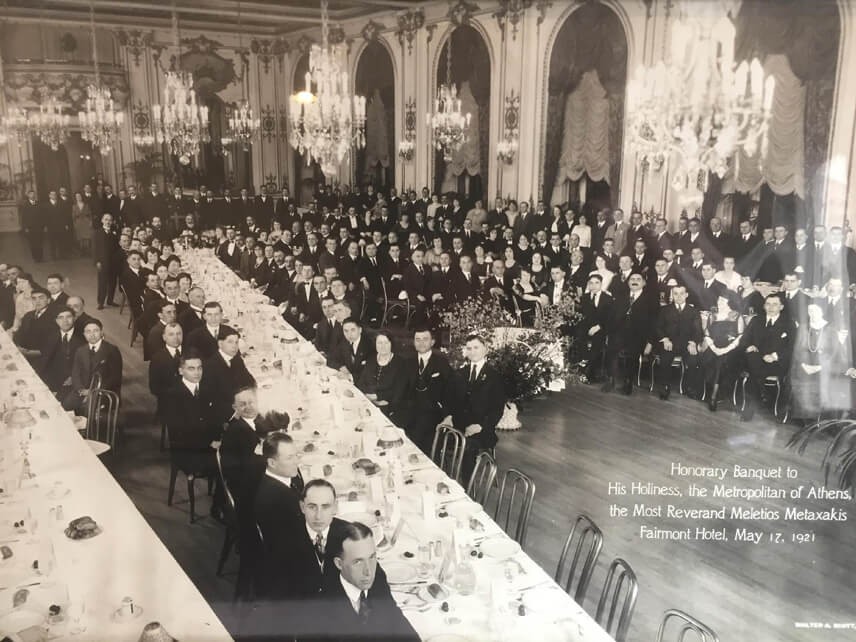Photograph of the May 17, 1921 banquet, where the Cathedral was founded by acclamation, as referred to in the May 19, 1921 minutes. From the Cathedral’s archives.
Minutes from the founding meeting of May 19, 1921. The Cathedral had been come into being “by acclamation,” at a banquet two days previously. The minutes of the founding meeting of May 19, deal with by-laws and governance. The original minutes reside in the Cathedral’s archives.
Today, Thursday, May 19, 1921, at 9 p.m. Archimandrite Ph. Joannides, D. Kapatos, Kokos, Chr. Antoniades, J. Jerome, D. Douvaras, G. Giannopoulos, K. Molakides, Chr. Catharios, D. Glafkides, Ch. Frangogiannis, J. Pantazopoulos, Chr. Saris, G. Kardiakos, G. Evangelou, Th. Doumanis, S. Bonatsos, Emm. Vogiatzis, G. Meletopoulos, Al. Alimisis, convening in room no.
[ ] of the Phelan Building, under the chairmanship of His Eminence Meletios, Metropolitan of Athens, with G. Polyzoides serving as secretary, met and acted as follows:
Taking the floor, His Eminence the President declares he is still moved by the establishment of the Church and School during the banquet on May 17 at the Fairmont Hotel, a most generous gesture by those present. He notes that the Community of San Francisco has been designated to become the Seat for the Diocese of the Western States. It is for this reason that the Church to be established has been given the name Cathedral, as it comprises the center of spiritual worship for the surrounding parishes. He notes, besides, that the establishment was necessitated by the nature of things, the fact that the City of San Francisco has 5-6 thousand Greeks. It is not a matter, he says, of dividing the Community, but rather of filling the present need, as it is becoming apparent at the present time. For the time being, two Churches in San Francisco are not a lot, taking into consideration that the more recent one will also be an educational center. Mr. Al. Alimisis reads a plan for incorporating, in English, and in Greek translation.
Following the reading, D. Kapatos has the floor and asks for an explanation of the article according to which the parish property, in the event of dissolution of the corporation, devolves to the next highest corporation (the Diocese) and in the event of its dissolution, the next highest [corporation] (the Archdiocese).
Mr. G. Giannopoulos asks for an explanation of the article according to which, in the absence of the Bishop, the Priest presides. J. Jerome speaks in the same spirit.
Mr. Bonatsos notes that the Bishop should always preside, or the Priest, and should designate the 6 members of the Council, because he knows the appropriate individuals and, besides this, because he has the time needed [to do so].
Mr. Glafkides says that all the Churches should be directed by the Bishops, as it is in Turkey, and, in the absence of the Bishop, by the Priest, in which the financial situation is eased.
Mr. Kapatos speaks again, noting that the Bishop must have direct oversight, through the Priest, over the laity, who do not have the appropriate qualifications for this, nor the time required. He thinks that the plan for incorporating should be voted on as it is.
Emm. Vogiatzis agrees fully with the last speaker.
Mr. Meletopoulos conveys the opinion of many, and says that the Priest should only be honorary President of the Council.
Speaking a second time, Mr. Bonatsos observes that all community divisions up to the present time have come from the abuse of the office of the President and repeats, that the Priest must be the President; if this is not possible, then the institution of the President should be utterly abolished.
Mr. Kokkos reminds [the group] that, according to American law concerning corporations, the members and the President are elected by the members of the Council.
Mr. Th. Doumanis thinks that the President should be elected by the Council and, because the Priest has the necessary qualifications, he will always be elected.
Mr. Catharios thinks that it is necessary to try this plan and declares that he is ready to sign.
Mr. J. Jerome declares that, by signing the plan, all rights are being given to the Bishop and, in his absence, to the Priest.
In summary, His Eminence the President expresses his joy, because all the arguments were discussed in a composed manner. We belong, he says, to a nation which gave Democracy, and the Church is democratic, as its history shows, in contrast to absolutist Rome (Pope), and leaderless Protestantism. We find ourselves in a land where all three forms of [church] governance exist. We will not find a church in which the spiritual head is not President of the Church Council. Our canons explicitly define the role of the Priest (Canon of Penthekte). The Priest is not the servant of the Council, but the soul of the Church. In Greece, from 1909, a place in the Council is accorded the Priest. The new law says that the Priest is honored as the natural person in charge of community as President of the Parish Council; even the Protestants have the Priest as President of the church (Rector) (?) nor is the designation of the Council opposed to the law, because there are religious bodies here in which the Priest designates all the members of the Council. He repeats, however, once again, that the Bishop will be designating one half of the members, and not the Priest. Now the institution of an elected and appointed [Council] is imposed here, inasmuch as the Church here is the Cathedral and the Bishop will be seeking to exercise his authority over the rest of the communities under him. It will be advantageous [for him] to appoint the 6 members from among the best parishioners. The priest will not be selecting the 6 members because, then, every unfortunate turn in the communities will be ascribed to him. Of the members of the Council, half will be replaced, while the rest will remain, in order that the normal course of the work of the Council be continued. As for the assignment of the clergy, the head Priest of the Cathedral is assigned by the Bishop, while the other priests are recommended by the Community and assigned by the Bishop.
Mr. Jerome thinks that, since the majority will be in the hands of the Bishop, there will be a reaction on the part of many.
Mr. Kapatos observes that their term will not influence the convictions of the appointed Council, while Mr. Kokos persists in the opinion that many individuals must be proposed in advance to the Bishop and he will appoint 4 or 6 from among them.
Following much deliberation, it is proposed that the following be accepted unanimously, namely: the Council will consist of twelve members; six (6) will be elected by the people, five (5) will be assigned by the Bishop, and one will be ex officio.
Mr. S. Bonatsos moves the adoption of the plan as this is approved unanimously, enthusiastically.
It is proposed that certain ones of those present not comprise the first Council; however, because some are withdrawing, His Eminence the President asks for a vote of confidence so that he might appoint the first Council: this is accepted by acclamation. Mr. Jerome proposes that a discussion about certain individuals take place at another time in private.
In closing, divine blessing is invoked upon the work which is being undertaken and, because of the lateness of the hour, the meeting comes to a close.
In San Francisco the 19th of May 1921
The President
+Meletios of Athens
(Seal)
The Secretary
G. Polyzoides
{Note: The group met again on May 20, May 21, May 24, May 30, June 1, June 2, June 7, June 10, June 12, June 13, June 15, June 17, June 20, June 21, June 23, June 29 June 30, July 5, July 11, July 18, August 23, and August 24. All had to do with aspects the organization of the Cathedral, along with the Diocese of San Francisco, including purchasing of property at Hayes and Pierce Streets, raising funds, engaging clergy, and building buildings. It was an intensive period of hard work. Meletios left San Francisco for Chicago, following the June 30th meeting, leaving Archimandrite Philaretos Johannides as President of the Cathedral and the Reverend Pythagoras Caravellas as secretary. When the Chicago diocese was organized, Philaretos was named first bishop of Chicago, leaving Father Caravellas as president. Father Caravellas died in 1934, at the age of 44. Once again, the minutes of the meetings, all in the original Greek, reside in the Cathedral’s archives.]




